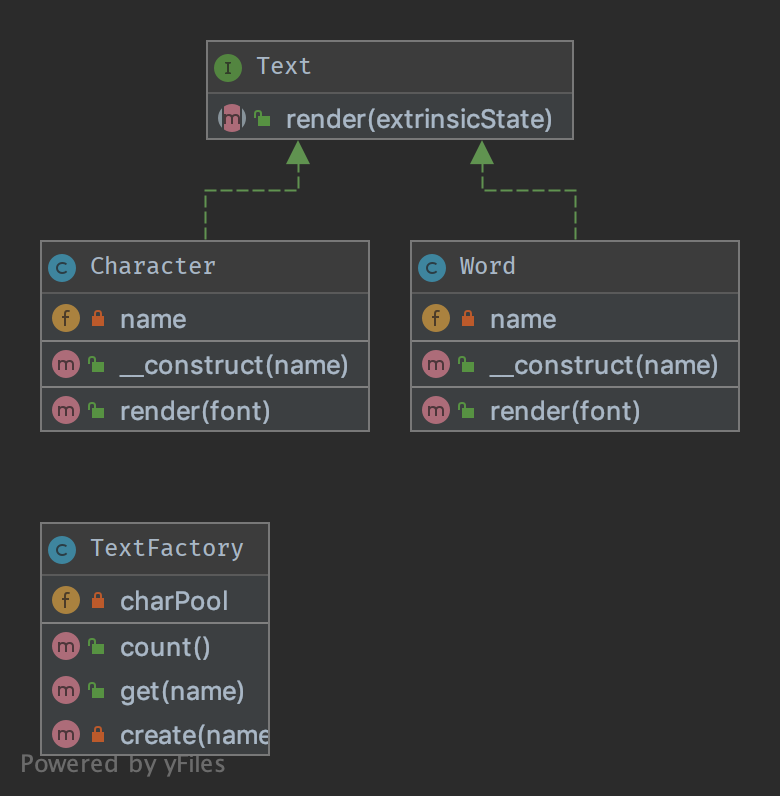PHP 享元模式(Flyweight)
2022-03-21 18:05 更新
目的
为了最大限度地减少内存使用,享元与相似对象共享尽可能多的内存。当使用大量状态差异不大的对象时需要它。一种常见的做法是将状态保存在外部数据结构中,并在需要时将它们传递给享元对象。
UML 图

代码
Text.php
<?php
declare(strict_types=1);
namespace DesignPatterns\Structural\Flyweight;
/**
* This is the interface that all flyweights need to implement
*/
interface Text
{
public function render(string $extrinsicState): string;
}Word.php
<?php
namespace DesignPatterns\Structural\Flyweight;
class Word implements Text
{
public function __construct(private string $name)
{
}
public function render(string $extrinsicState): string
{
return sprintf('Word %s with font %s', $this->name, $extrinsicState);
}
}Character.php
<?php
declare(strict_types=1);
namespace DesignPatterns\Structural\Flyweight;
/**
* Implements the flyweight interface and adds storage for intrinsic state, if any.
* Instances of concrete flyweights are shared by means of a factory.
*/
class Character implements Text
{
/**
* Any state stored by the concrete flyweight must be independent of its context.
* For flyweights representing characters, this is usually the corresponding character code.
*/
public function __construct(private string $name)
{
}
public function render(string $extrinsicState): string
{
// Clients supply the context-dependent information that the flyweight needs to draw itself
// For flyweights representing characters, extrinsic state usually contains e.g. the font.
return sprintf('Character %s with font %s', $this->name, $extrinsicState);
}
}TextFactory.php
<?php
declare(strict_types=1);
namespace DesignPatterns\Structural\Flyweight;
use Countable;
/**
* A factory manages shared flyweights. Clients should not instantiate them directly,
* but let the factory take care of returning existing objects or creating new ones.
*/
class TextFactory implements Countable
{
/**
* @var Text[]
*/
private array $charPool = [];
public function get(string $name): Text
{
if (!isset($this->charPool[$name])) {
$this->charPool[$name] = $this->create($name);
}
return $this->charPool[$name];
}
private function create(string $name): Text
{
if (strlen($name) == 1) {
return new Character($name);
} else {
return new Word($name);
}
}
public function count(): int
{
return count($this->charPool);
}
}测试
Tests/FlyweightTest.php
<?php
declare(strict_types=1);
namespace DesignPatterns\Structural\Flyweight\Tests;
use DesignPatterns\Structural\Flyweight\TextFactory;
use PHPUnit\Framework\TestCase;
class FlyweightTest extends TestCase
{
private array $characters = ['a', 'b', 'c', 'd', 'e', 'f', 'g', 'h', 'i', 'j', 'k',
'l', 'm', 'n', 'o', 'p', 'q', 'r', 's', 't', 'u', 'v', 'w', 'x', 'y', 'z'];
private array $fonts = ['Arial', 'Times New Roman', 'Verdana', 'Helvetica'];
public function testFlyweight()
{
$factory = new TextFactory();
for ($i = 0; $i <= 10; $i++) {
foreach ($this->characters as $char) {
foreach ($this->fonts as $font) {
$flyweight = $factory->get($char);
$rendered = $flyweight->render($font);
$this->assertSame(sprintf('Character %s with font %s', $char, $font), $rendered);
}
}
}
foreach ($this->fonts as $word) {
$flyweight = $factory->get($word);
$rendered = $flyweight->render('foobar');
$this->assertSame(sprintf('Word %s with font foobar', $word), $rendered);
}
// Flyweight pattern ensures that instances are shared
// instead of having hundreds of thousands of individual objects
// there must be one instance for every char that has been reused for displaying in different fonts
$this->assertCount(count($this->characters) + count($this->fonts), $factory);
}
}以上内容是否对您有帮助:





更多建议: